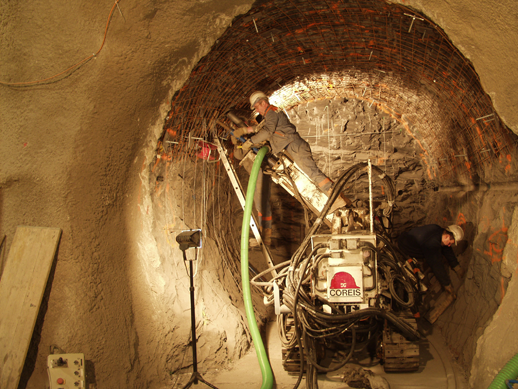Mont Terri Rock Laboratory
The objective of the international Mont Terri Rock Laboratory Research Project is to study the geological, hydrogeological, geochemical and geomechanical properties of Opalinus clay. These properties are critically important for the assessment of the safety and technical feasibility of a deep geological repository for radioactive waste in this type of rock.
In 2009, ENSI’s research work focused on the Rock Mass Characterisation (RC) experiment which was carried out by the Engineering Geology department of the Swiss Federal Institute of Technology (ETH), Zurich. There are two main aspects of this experimental work, which will continue for several years: study of the deformations induced by the construction of a new gallery (Gallery 08), and recording of long-term deformations that proceed very slowly. Particular interest attaches to the influence of existing discontinuities (separating areas such as clefts, shear zones, faults or stratification) on the mechanical rock behaviour of Opalinus clay. Scientific evaluations have been carried out on most of the deformation measurements in observation bores, the geodetic displacement measurements on the periphery of the cavity, and the extensive displacements in the test section which were evaluated with the help of laser scanning.
The data show that, to a great extent, the rock behaviour is controlled by the rock and mountain anisotropy and by heterogeneities. Observations during the excavation of the gallery section show that the mechanical behaviour of Opalinus clay is determined by a combination of sliding displacements along existing separating areas (shear zones, clefts), shear failure along the stratification, and brittle fracture processes. In order to verify this rock behaviour, laboratory experiments were also carried out on Opalinus clay rock samples to determine key rock-mechanical values (by ETH Zurich together with the Technical University of Graz).
ENSI has also participated in two smaller follow-up experiments in the EZ-B niche at ENSI: firstly, the Cyclic Deformation (CD) experiment investigates the cyclical drying behaviour of the gallery wall in relation to the gallery climate (temperature, air humidity). Secondly, together with swisstopo, ENSI is conducting the Evaporation Logging (FM-D) experiment to evaluate a new method of determining porosity (evaporation logging) in bores.


